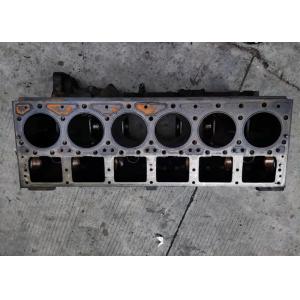QSM11 Used Diesel Engine Blocks For Excavator R385-9 4060393 4060394
Add to Cart
QSM11 Diesel Used Engine Blocks For Excavator R385 - 9 4060393 4060394
Specification
| Engine type: Diesel | Model Number: QSM11 | |
| Cylinder stroke: 145 | Cylinder diameter: 114 | |
| Application: Excavator | valve: 24 valve | |
| Cooling: Water cooling | Injection: Direct or Electric | |
Description
Outlook
The strength potential of aluminium has been hardly exploited in
gasoline engines today. An optimisation of the common AlSiCu and
AlSiMg casting alloys, the available casting processes and of
subsequent heat treatments still offers significant growth
potential for hardness and strength. Also for diesel engine blocks,
the maximum lightweighting potential of aluminium has not yet been
reached. The remaining potential in the areas of component design,
alloy development and process improvements, but in particular also
cylinder surface treatment technologies like plasma sprayed
coatings suggest that aluminium will continue its advance in diesel
engines.
On the other hand, in view of the increasing component loads due to
the significantly higher firing pressures in future diesel engines,
cast iron in the form of compacted graphite iron (CGI) is again
competing with aluminium. Compared to the conventional lamellar
graphite cast iron, CGI enables the realisation of smaller cross
sections. The nodularity and tensile strength of the material also
increases as wall-section decreases. The thermal and damping
characteristics of CGI are midway between ductile and gray iron. It
is five times more fatigue resistant than aluminium at elevated
temperatures, and twice as resistant to metal fatigue as gray iron.
Theoretically, a CGI engine block can be fabricated lighter than an
aluminum block for equal power densities. Therefore CGI engine
blocks are now gaining ground in high performance diesel engines,
in particular in V-engines as there is a lot of flexing in the
V-area between the cylinders when it is under power. CGI
strengthens this physical area considerably.
Compared to all-aluminium engine blocks, additional lightweighting
can be realized with a composite magnesium-aluminium alloy engine
block as produced at BMW’s Landshut plant. The new
magnesium-aluminum alloy crankcase for six-cylinder in-line
gasoline engines is 24% lighter than a conventional aluminium
block. A specific magnesium alloy system and a high pressure die
casting (HPDC) process were developed together with the engine’s
design.
Aluminium inserts incorporating cylinder liners and coolant ducts
are used in the engine block. As the magnesium housing shrinks
around the aluminium insert, the thermally complex casting process
ensures that both components heat up and cool down at precisely the
right time during production. The magnesium alloy engine shell
never comes into direct contact with coolant water, since the water
only flows inside the aluminum cylinder inserts.



